Holmes Institute: HA3011 Advanced Financial Accounting - Essay
VerifiedAdded on 2023/03/31
|13
|2754
|367
Essay
AI Summary
This essay provides an analysis of advanced financial accounting concepts, using Origin Energy Limited as a case study. It discusses key accounting concepts such as going concern, accrual, consistency, conservatism, and cost. The essay also examines the conceptual framework, measurement issues including historical cost, exit price, fair value, and current cost accounting, and fundamental qualitative characteristics like relevance and representational faithfulness. The analysis is grounded in accounting standards and practices relevant to Origin Energy Limited's financial reporting. Desklib provides access to similar solved assignments and study resources for students.
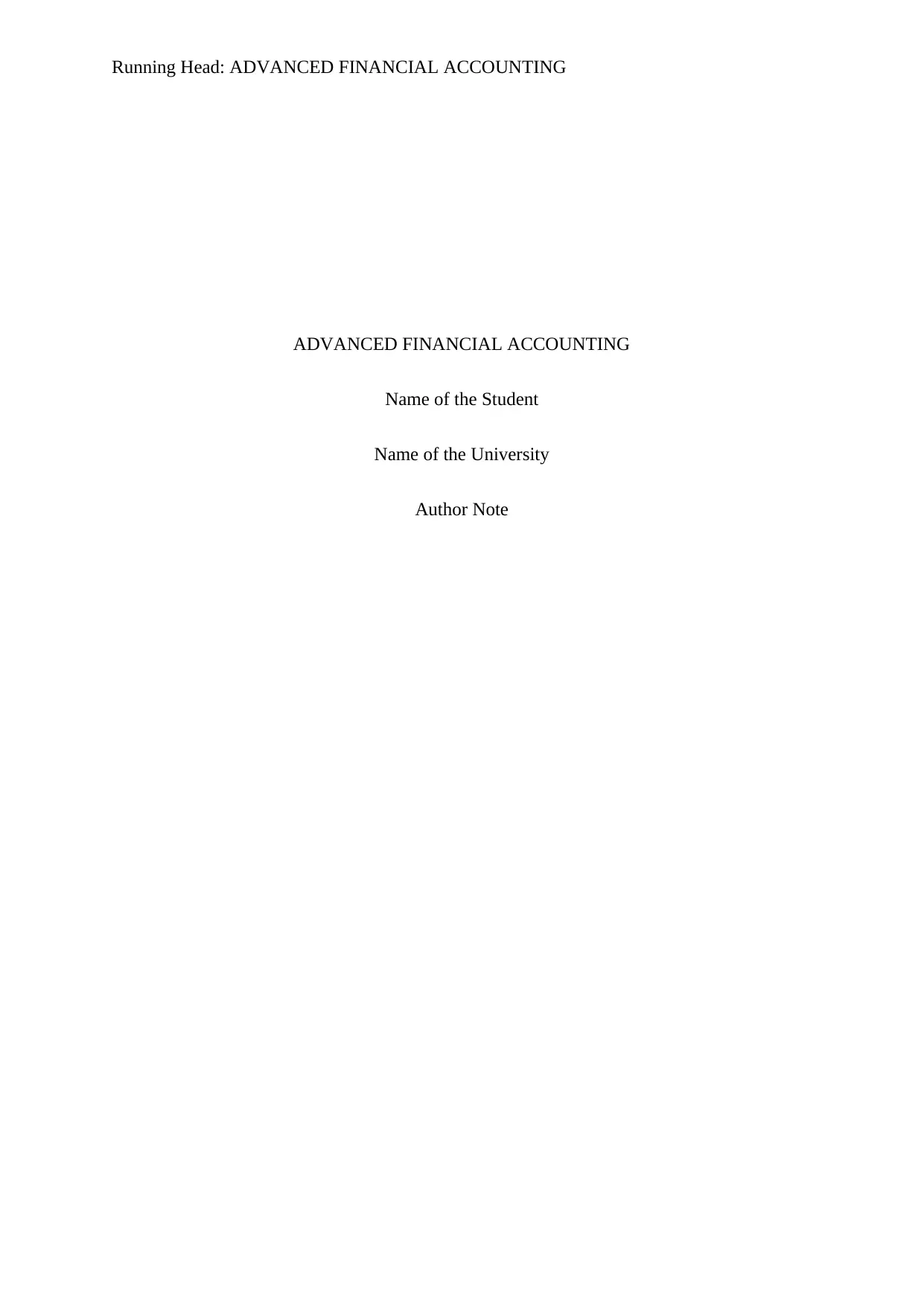
Running Head: ADVANCED FINANCIAL ACCOUNTING
ADVANCED FINANCIAL ACCOUNTING
Name of the Student
Name of the University
Author Note
ADVANCED FINANCIAL ACCOUNTING
Name of the Student
Name of the University
Author Note
Paraphrase This Document
Need a fresh take? Get an instant paraphrase of this document with our AI Paraphraser
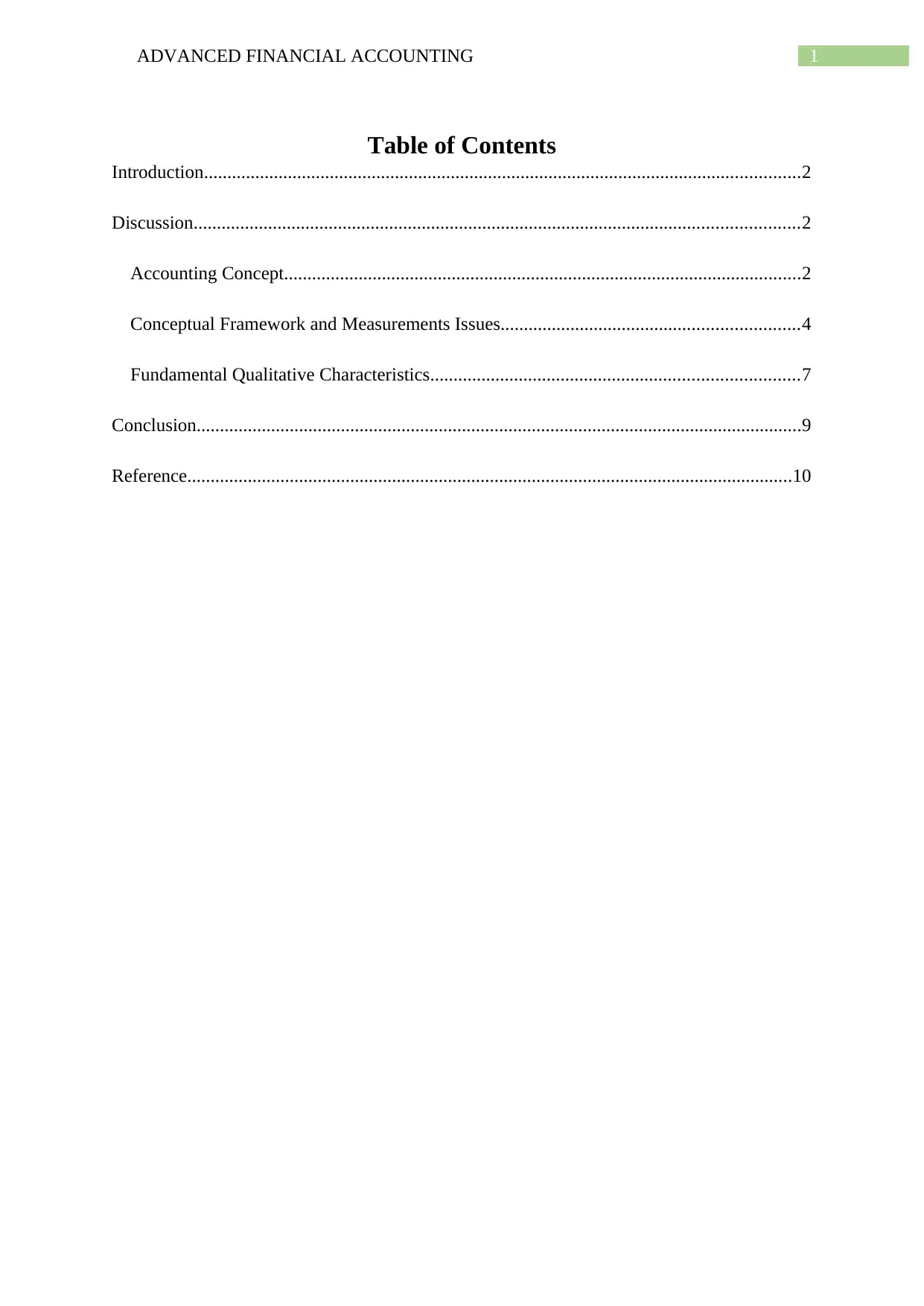
1ADVANCED FINANCIAL ACCOUNTING
Table of Contents
Introduction................................................................................................................................2
Discussion..................................................................................................................................2
Accounting Concept...............................................................................................................2
Conceptual Framework and Measurements Issues................................................................4
Fundamental Qualitative Characteristics...............................................................................7
Conclusion..................................................................................................................................9
Reference..................................................................................................................................10
Table of Contents
Introduction................................................................................................................................2
Discussion..................................................................................................................................2
Accounting Concept...............................................................................................................2
Conceptual Framework and Measurements Issues................................................................4
Fundamental Qualitative Characteristics...............................................................................7
Conclusion..................................................................................................................................9
Reference..................................................................................................................................10
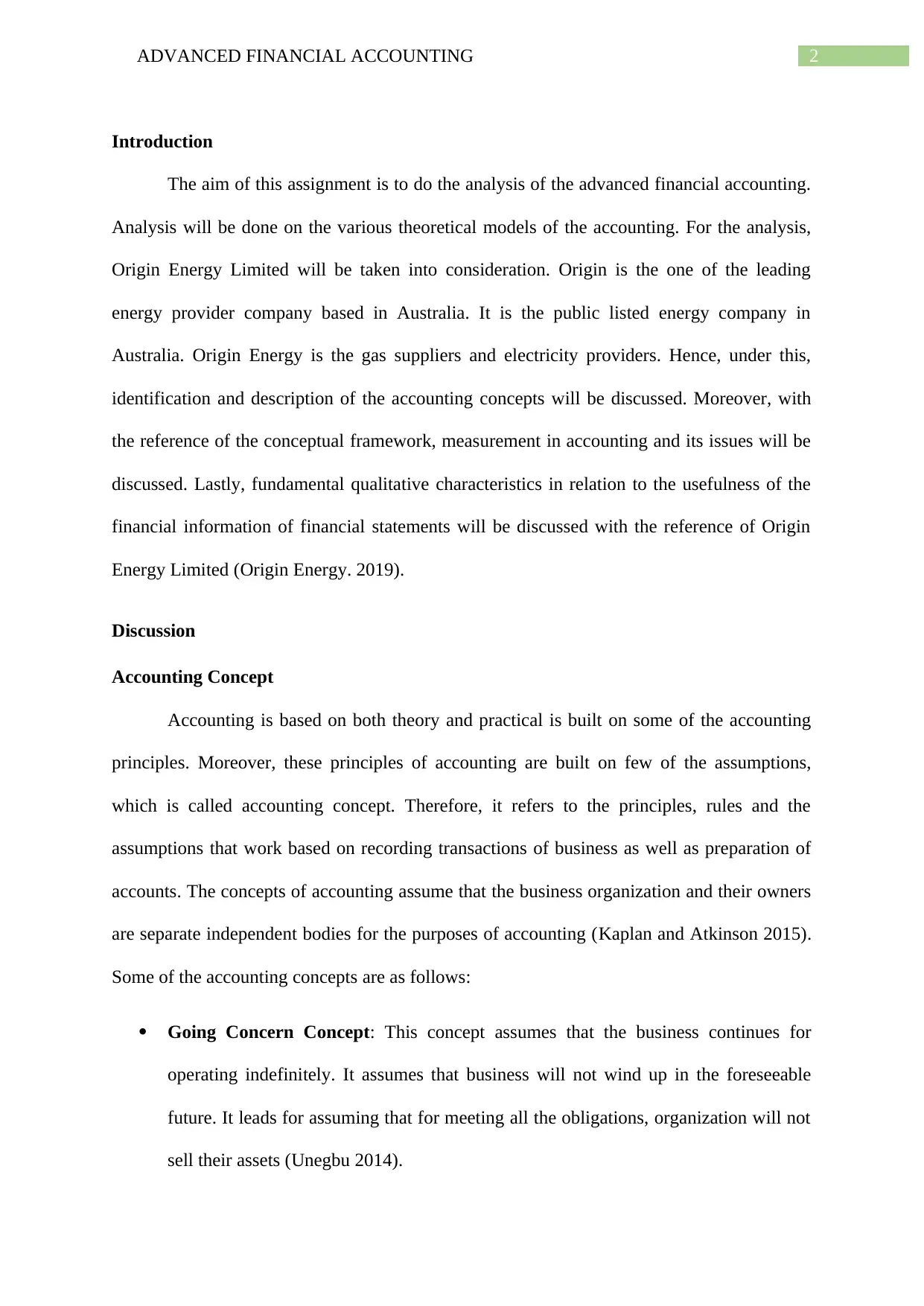
2ADVANCED FINANCIAL ACCOUNTING
Introduction
The aim of this assignment is to do the analysis of the advanced financial accounting.
Analysis will be done on the various theoretical models of the accounting. For the analysis,
Origin Energy Limited will be taken into consideration. Origin is the one of the leading
energy provider company based in Australia. It is the public listed energy company in
Australia. Origin Energy is the gas suppliers and electricity providers. Hence, under this,
identification and description of the accounting concepts will be discussed. Moreover, with
the reference of the conceptual framework, measurement in accounting and its issues will be
discussed. Lastly, fundamental qualitative characteristics in relation to the usefulness of the
financial information of financial statements will be discussed with the reference of Origin
Energy Limited (Origin Energy. 2019).
Discussion
Accounting Concept
Accounting is based on both theory and practical is built on some of the accounting
principles. Moreover, these principles of accounting are built on few of the assumptions,
which is called accounting concept. Therefore, it refers to the principles, rules and the
assumptions that work based on recording transactions of business as well as preparation of
accounts. The concepts of accounting assume that the business organization and their owners
are separate independent bodies for the purposes of accounting (Kaplan and Atkinson 2015).
Some of the accounting concepts are as follows:
Going Concern Concept: This concept assumes that the business continues for
operating indefinitely. It assumes that business will not wind up in the foreseeable
future. It leads for assuming that for meeting all the obligations, organization will not
sell their assets (Unegbu 2014).
Introduction
The aim of this assignment is to do the analysis of the advanced financial accounting.
Analysis will be done on the various theoretical models of the accounting. For the analysis,
Origin Energy Limited will be taken into consideration. Origin is the one of the leading
energy provider company based in Australia. It is the public listed energy company in
Australia. Origin Energy is the gas suppliers and electricity providers. Hence, under this,
identification and description of the accounting concepts will be discussed. Moreover, with
the reference of the conceptual framework, measurement in accounting and its issues will be
discussed. Lastly, fundamental qualitative characteristics in relation to the usefulness of the
financial information of financial statements will be discussed with the reference of Origin
Energy Limited (Origin Energy. 2019).
Discussion
Accounting Concept
Accounting is based on both theory and practical is built on some of the accounting
principles. Moreover, these principles of accounting are built on few of the assumptions,
which is called accounting concept. Therefore, it refers to the principles, rules and the
assumptions that work based on recording transactions of business as well as preparation of
accounts. The concepts of accounting assume that the business organization and their owners
are separate independent bodies for the purposes of accounting (Kaplan and Atkinson 2015).
Some of the accounting concepts are as follows:
Going Concern Concept: This concept assumes that the business continues for
operating indefinitely. It assumes that business will not wind up in the foreseeable
future. It leads for assuming that for meeting all the obligations, organization will not
sell their assets (Unegbu 2014).
⊘ This is a preview!⊘
Do you want full access?
Subscribe today to unlock all pages.

Trusted by 1+ million students worldwide
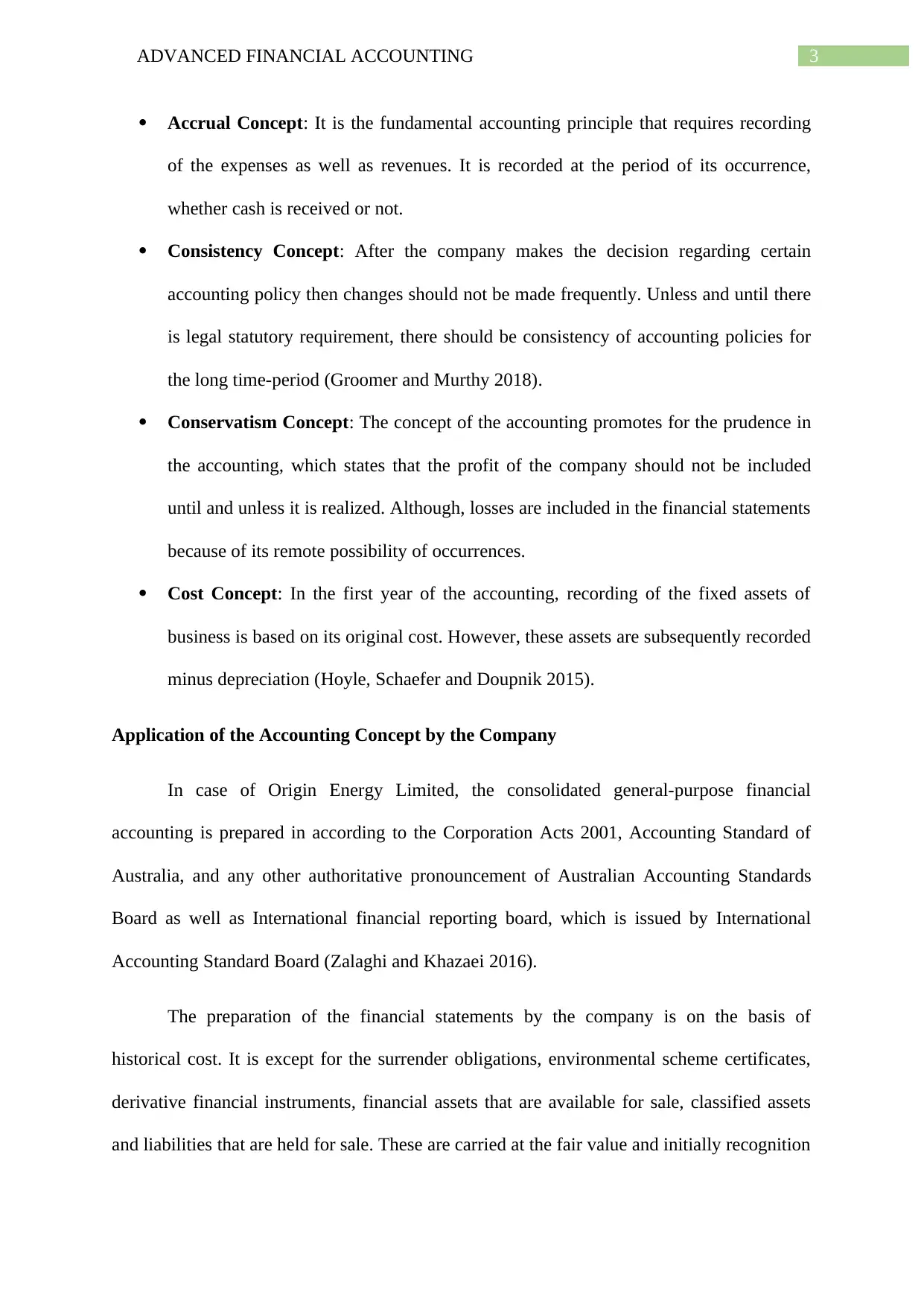
3ADVANCED FINANCIAL ACCOUNTING
Accrual Concept: It is the fundamental accounting principle that requires recording
of the expenses as well as revenues. It is recorded at the period of its occurrence,
whether cash is received or not.
Consistency Concept: After the company makes the decision regarding certain
accounting policy then changes should not be made frequently. Unless and until there
is legal statutory requirement, there should be consistency of accounting policies for
the long time-period (Groomer and Murthy 2018).
Conservatism Concept: The concept of the accounting promotes for the prudence in
the accounting, which states that the profit of the company should not be included
until and unless it is realized. Although, losses are included in the financial statements
because of its remote possibility of occurrences.
Cost Concept: In the first year of the accounting, recording of the fixed assets of
business is based on its original cost. However, these assets are subsequently recorded
minus depreciation (Hoyle, Schaefer and Doupnik 2015).
Application of the Accounting Concept by the Company
In case of Origin Energy Limited, the consolidated general-purpose financial
accounting is prepared in according to the Corporation Acts 2001, Accounting Standard of
Australia, and any other authoritative pronouncement of Australian Accounting Standards
Board as well as International financial reporting board, which is issued by International
Accounting Standard Board (Zalaghi and Khazaei 2016).
The preparation of the financial statements by the company is on the basis of
historical cost. It is except for the surrender obligations, environmental scheme certificates,
derivative financial instruments, financial assets that are available for sale, classified assets
and liabilities that are held for sale. These are carried at the fair value and initially recognition
Accrual Concept: It is the fundamental accounting principle that requires recording
of the expenses as well as revenues. It is recorded at the period of its occurrence,
whether cash is received or not.
Consistency Concept: After the company makes the decision regarding certain
accounting policy then changes should not be made frequently. Unless and until there
is legal statutory requirement, there should be consistency of accounting policies for
the long time-period (Groomer and Murthy 2018).
Conservatism Concept: The concept of the accounting promotes for the prudence in
the accounting, which states that the profit of the company should not be included
until and unless it is realized. Although, losses are included in the financial statements
because of its remote possibility of occurrences.
Cost Concept: In the first year of the accounting, recording of the fixed assets of
business is based on its original cost. However, these assets are subsequently recorded
minus depreciation (Hoyle, Schaefer and Doupnik 2015).
Application of the Accounting Concept by the Company
In case of Origin Energy Limited, the consolidated general-purpose financial
accounting is prepared in according to the Corporation Acts 2001, Accounting Standard of
Australia, and any other authoritative pronouncement of Australian Accounting Standards
Board as well as International financial reporting board, which is issued by International
Accounting Standard Board (Zalaghi and Khazaei 2016).
The preparation of the financial statements by the company is on the basis of
historical cost. It is except for the surrender obligations, environmental scheme certificates,
derivative financial instruments, financial assets that are available for sale, classified assets
and liabilities that are held for sale. These are carried at the fair value and initially recognition
Paraphrase This Document
Need a fresh take? Get an instant paraphrase of this document with our AI Paraphraser
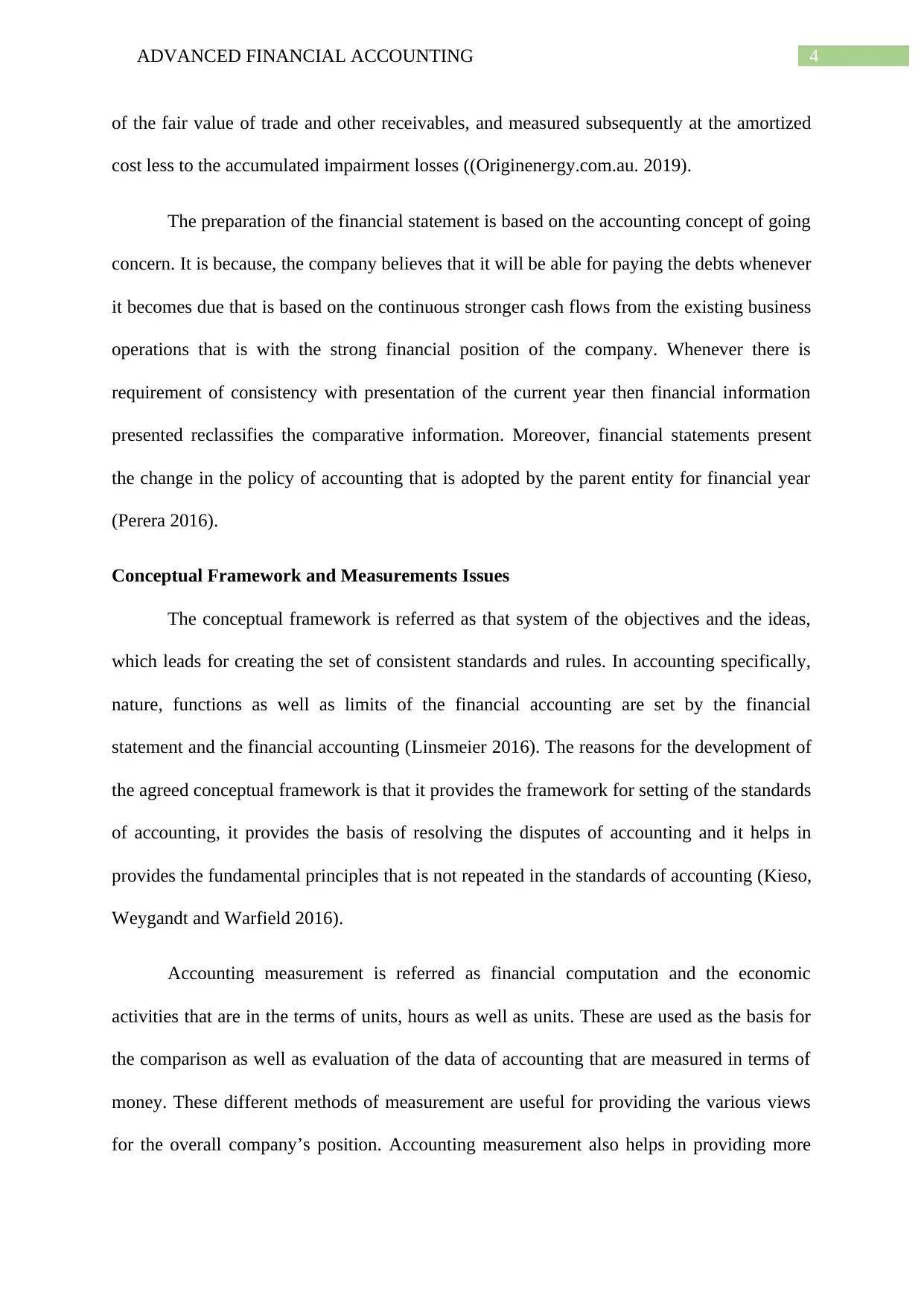
4ADVANCED FINANCIAL ACCOUNTING
of the fair value of trade and other receivables, and measured subsequently at the amortized
cost less to the accumulated impairment losses ((Originenergy.com.au. 2019).
The preparation of the financial statement is based on the accounting concept of going
concern. It is because, the company believes that it will be able for paying the debts whenever
it becomes due that is based on the continuous stronger cash flows from the existing business
operations that is with the strong financial position of the company. Whenever there is
requirement of consistency with presentation of the current year then financial information
presented reclassifies the comparative information. Moreover, financial statements present
the change in the policy of accounting that is adopted by the parent entity for financial year
(Perera 2016).
Conceptual Framework and Measurements Issues
The conceptual framework is referred as that system of the objectives and the ideas,
which leads for creating the set of consistent standards and rules. In accounting specifically,
nature, functions as well as limits of the financial accounting are set by the financial
statement and the financial accounting (Linsmeier 2016). The reasons for the development of
the agreed conceptual framework is that it provides the framework for setting of the standards
of accounting, it provides the basis of resolving the disputes of accounting and it helps in
provides the fundamental principles that is not repeated in the standards of accounting (Kieso,
Weygandt and Warfield 2016).
Accounting measurement is referred as financial computation and the economic
activities that are in the terms of units, hours as well as units. These are used as the basis for
the comparison as well as evaluation of the data of accounting that are measured in terms of
money. These different methods of measurement are useful for providing the various views
for the overall company’s position. Accounting measurement also helps in providing more
of the fair value of trade and other receivables, and measured subsequently at the amortized
cost less to the accumulated impairment losses ((Originenergy.com.au. 2019).
The preparation of the financial statement is based on the accounting concept of going
concern. It is because, the company believes that it will be able for paying the debts whenever
it becomes due that is based on the continuous stronger cash flows from the existing business
operations that is with the strong financial position of the company. Whenever there is
requirement of consistency with presentation of the current year then financial information
presented reclassifies the comparative information. Moreover, financial statements present
the change in the policy of accounting that is adopted by the parent entity for financial year
(Perera 2016).
Conceptual Framework and Measurements Issues
The conceptual framework is referred as that system of the objectives and the ideas,
which leads for creating the set of consistent standards and rules. In accounting specifically,
nature, functions as well as limits of the financial accounting are set by the financial
statement and the financial accounting (Linsmeier 2016). The reasons for the development of
the agreed conceptual framework is that it provides the framework for setting of the standards
of accounting, it provides the basis of resolving the disputes of accounting and it helps in
provides the fundamental principles that is not repeated in the standards of accounting (Kieso,
Weygandt and Warfield 2016).
Accounting measurement is referred as financial computation and the economic
activities that are in the terms of units, hours as well as units. These are used as the basis for
the comparison as well as evaluation of the data of accounting that are measured in terms of
money. These different methods of measurement are useful for providing the various views
for the overall company’s position. Accounting measurement also helps in providing more
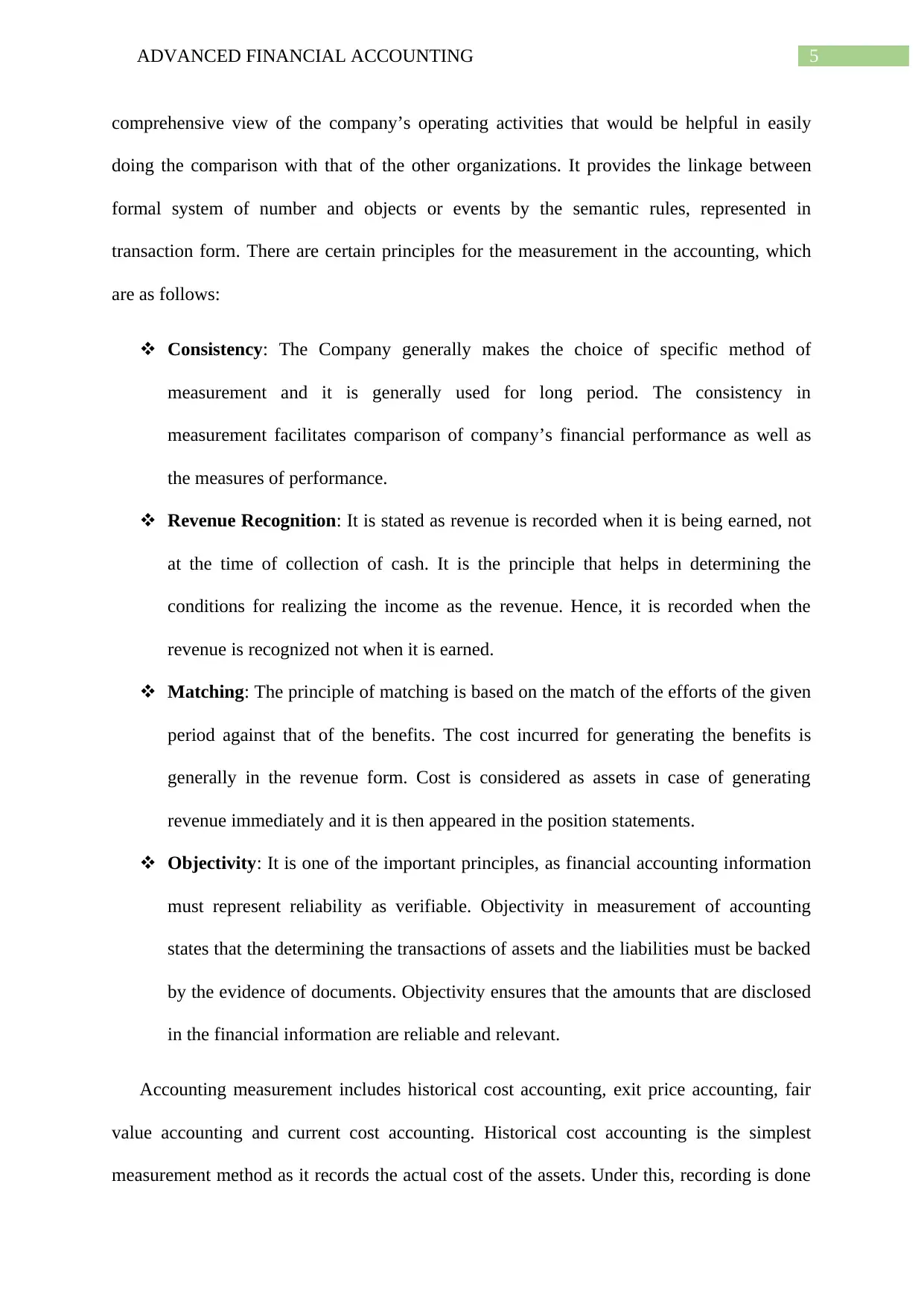
5ADVANCED FINANCIAL ACCOUNTING
comprehensive view of the company’s operating activities that would be helpful in easily
doing the comparison with that of the other organizations. It provides the linkage between
formal system of number and objects or events by the semantic rules, represented in
transaction form. There are certain principles for the measurement in the accounting, which
are as follows:
Consistency: The Company generally makes the choice of specific method of
measurement and it is generally used for long period. The consistency in
measurement facilitates comparison of company’s financial performance as well as
the measures of performance.
Revenue Recognition: It is stated as revenue is recorded when it is being earned, not
at the time of collection of cash. It is the principle that helps in determining the
conditions for realizing the income as the revenue. Hence, it is recorded when the
revenue is recognized not when it is earned.
Matching: The principle of matching is based on the match of the efforts of the given
period against that of the benefits. The cost incurred for generating the benefits is
generally in the revenue form. Cost is considered as assets in case of generating
revenue immediately and it is then appeared in the position statements.
Objectivity: It is one of the important principles, as financial accounting information
must represent reliability as verifiable. Objectivity in measurement of accounting
states that the determining the transactions of assets and the liabilities must be backed
by the evidence of documents. Objectivity ensures that the amounts that are disclosed
in the financial information are reliable and relevant.
Accounting measurement includes historical cost accounting, exit price accounting, fair
value accounting and current cost accounting. Historical cost accounting is the simplest
measurement method as it records the actual cost of the assets. Under this, recording is done
comprehensive view of the company’s operating activities that would be helpful in easily
doing the comparison with that of the other organizations. It provides the linkage between
formal system of number and objects or events by the semantic rules, represented in
transaction form. There are certain principles for the measurement in the accounting, which
are as follows:
Consistency: The Company generally makes the choice of specific method of
measurement and it is generally used for long period. The consistency in
measurement facilitates comparison of company’s financial performance as well as
the measures of performance.
Revenue Recognition: It is stated as revenue is recorded when it is being earned, not
at the time of collection of cash. It is the principle that helps in determining the
conditions for realizing the income as the revenue. Hence, it is recorded when the
revenue is recognized not when it is earned.
Matching: The principle of matching is based on the match of the efforts of the given
period against that of the benefits. The cost incurred for generating the benefits is
generally in the revenue form. Cost is considered as assets in case of generating
revenue immediately and it is then appeared in the position statements.
Objectivity: It is one of the important principles, as financial accounting information
must represent reliability as verifiable. Objectivity in measurement of accounting
states that the determining the transactions of assets and the liabilities must be backed
by the evidence of documents. Objectivity ensures that the amounts that are disclosed
in the financial information are reliable and relevant.
Accounting measurement includes historical cost accounting, exit price accounting, fair
value accounting and current cost accounting. Historical cost accounting is the simplest
measurement method as it records the actual cost of the assets. Under this, recording is done
⊘ This is a preview!⊘
Do you want full access?
Subscribe today to unlock all pages.

Trusted by 1+ million students worldwide
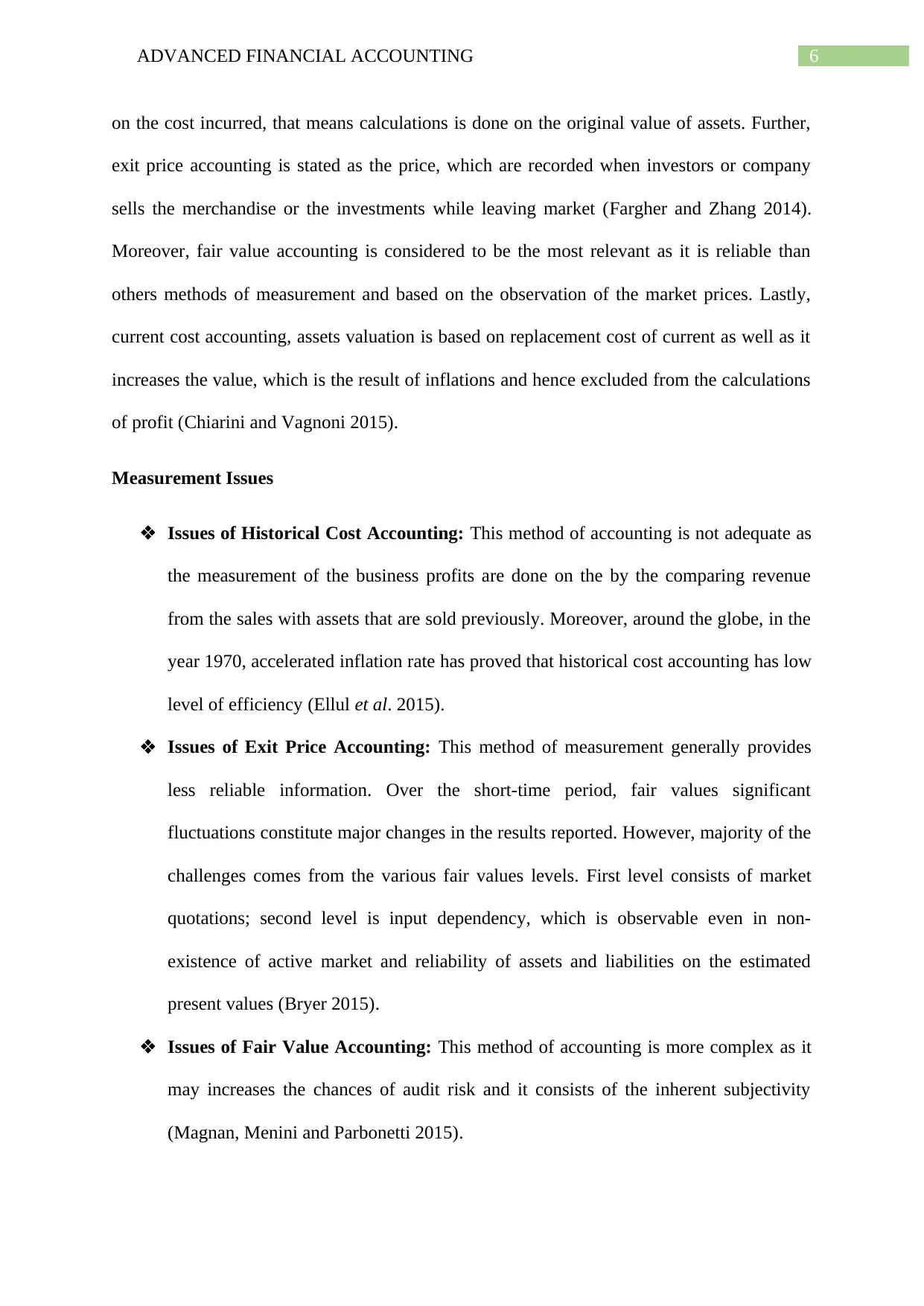
6ADVANCED FINANCIAL ACCOUNTING
on the cost incurred, that means calculations is done on the original value of assets. Further,
exit price accounting is stated as the price, which are recorded when investors or company
sells the merchandise or the investments while leaving market (Fargher and Zhang 2014).
Moreover, fair value accounting is considered to be the most relevant as it is reliable than
others methods of measurement and based on the observation of the market prices. Lastly,
current cost accounting, assets valuation is based on replacement cost of current as well as it
increases the value, which is the result of inflations and hence excluded from the calculations
of profit (Chiarini and Vagnoni 2015).
Measurement Issues
Issues of Historical Cost Accounting: This method of accounting is not adequate as
the measurement of the business profits are done on the by the comparing revenue
from the sales with assets that are sold previously. Moreover, around the globe, in the
year 1970, accelerated inflation rate has proved that historical cost accounting has low
level of efficiency (Ellul et al. 2015).
Issues of Exit Price Accounting: This method of measurement generally provides
less reliable information. Over the short-time period, fair values significant
fluctuations constitute major changes in the results reported. However, majority of the
challenges comes from the various fair values levels. First level consists of market
quotations; second level is input dependency, which is observable even in non-
existence of active market and reliability of assets and liabilities on the estimated
present values (Bryer 2015).
Issues of Fair Value Accounting: This method of accounting is more complex as it
may increases the chances of audit risk and it consists of the inherent subjectivity
(Magnan, Menini and Parbonetti 2015).
on the cost incurred, that means calculations is done on the original value of assets. Further,
exit price accounting is stated as the price, which are recorded when investors or company
sells the merchandise or the investments while leaving market (Fargher and Zhang 2014).
Moreover, fair value accounting is considered to be the most relevant as it is reliable than
others methods of measurement and based on the observation of the market prices. Lastly,
current cost accounting, assets valuation is based on replacement cost of current as well as it
increases the value, which is the result of inflations and hence excluded from the calculations
of profit (Chiarini and Vagnoni 2015).
Measurement Issues
Issues of Historical Cost Accounting: This method of accounting is not adequate as
the measurement of the business profits are done on the by the comparing revenue
from the sales with assets that are sold previously. Moreover, around the globe, in the
year 1970, accelerated inflation rate has proved that historical cost accounting has low
level of efficiency (Ellul et al. 2015).
Issues of Exit Price Accounting: This method of measurement generally provides
less reliable information. Over the short-time period, fair values significant
fluctuations constitute major changes in the results reported. However, majority of the
challenges comes from the various fair values levels. First level consists of market
quotations; second level is input dependency, which is observable even in non-
existence of active market and reliability of assets and liabilities on the estimated
present values (Bryer 2015).
Issues of Fair Value Accounting: This method of accounting is more complex as it
may increases the chances of audit risk and it consists of the inherent subjectivity
(Magnan, Menini and Parbonetti 2015).
Paraphrase This Document
Need a fresh take? Get an instant paraphrase of this document with our AI Paraphraser
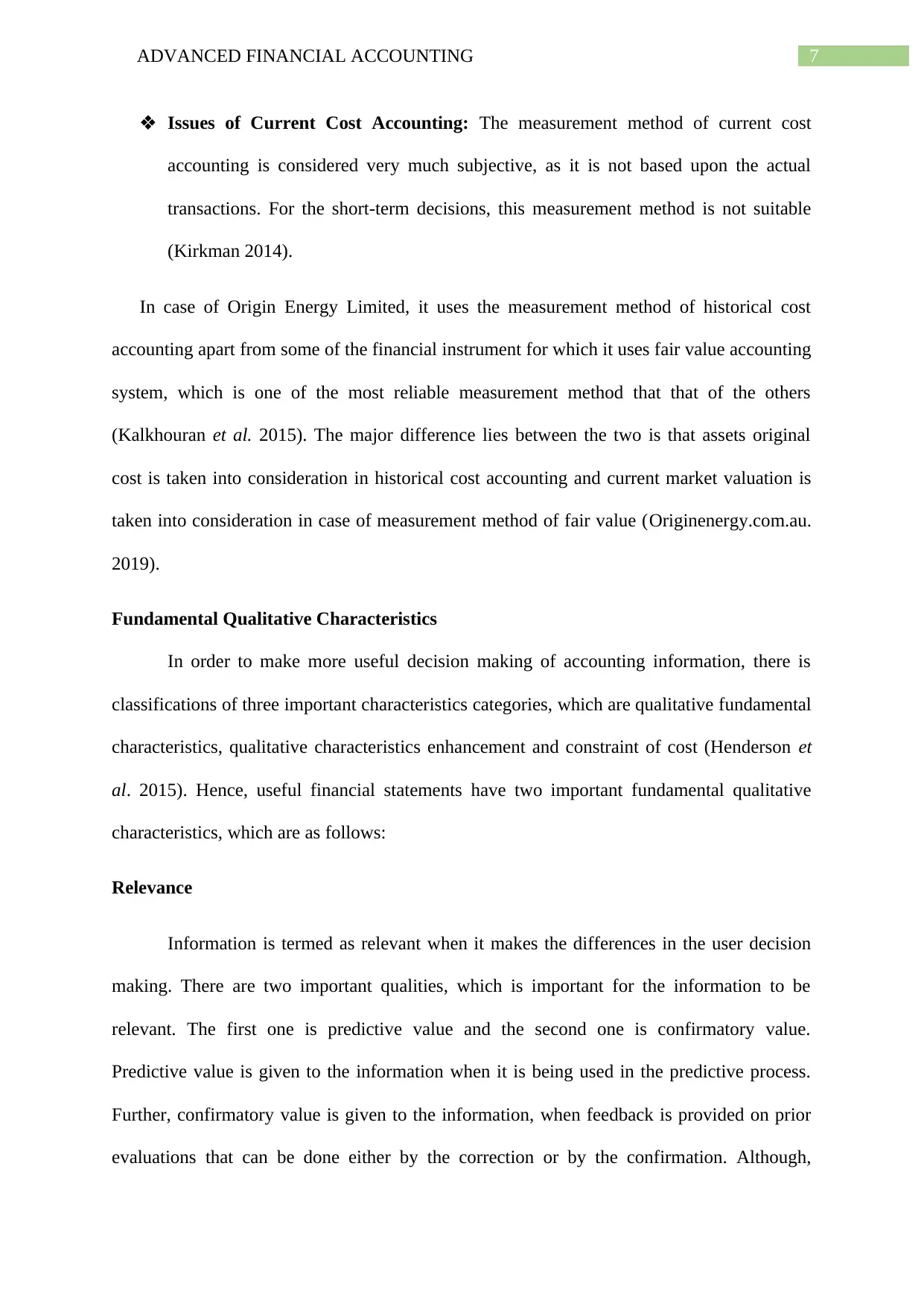
7ADVANCED FINANCIAL ACCOUNTING
Issues of Current Cost Accounting: The measurement method of current cost
accounting is considered very much subjective, as it is not based upon the actual
transactions. For the short-term decisions, this measurement method is not suitable
(Kirkman 2014).
In case of Origin Energy Limited, it uses the measurement method of historical cost
accounting apart from some of the financial instrument for which it uses fair value accounting
system, which is one of the most reliable measurement method that that of the others
(Kalkhouran et al. 2015). The major difference lies between the two is that assets original
cost is taken into consideration in historical cost accounting and current market valuation is
taken into consideration in case of measurement method of fair value (Originenergy.com.au.
2019).
Fundamental Qualitative Characteristics
In order to make more useful decision making of accounting information, there is
classifications of three important characteristics categories, which are qualitative fundamental
characteristics, qualitative characteristics enhancement and constraint of cost (Henderson et
al. 2015). Hence, useful financial statements have two important fundamental qualitative
characteristics, which are as follows:
Relevance
Information is termed as relevant when it makes the differences in the user decision
making. There are two important qualities, which is important for the information to be
relevant. The first one is predictive value and the second one is confirmatory value.
Predictive value is given to the information when it is being used in the predictive process.
Further, confirmatory value is given to the information, when feedback is provided on prior
evaluations that can be done either by the correction or by the confirmation. Although,
Issues of Current Cost Accounting: The measurement method of current cost
accounting is considered very much subjective, as it is not based upon the actual
transactions. For the short-term decisions, this measurement method is not suitable
(Kirkman 2014).
In case of Origin Energy Limited, it uses the measurement method of historical cost
accounting apart from some of the financial instrument for which it uses fair value accounting
system, which is one of the most reliable measurement method that that of the others
(Kalkhouran et al. 2015). The major difference lies between the two is that assets original
cost is taken into consideration in historical cost accounting and current market valuation is
taken into consideration in case of measurement method of fair value (Originenergy.com.au.
2019).
Fundamental Qualitative Characteristics
In order to make more useful decision making of accounting information, there is
classifications of three important characteristics categories, which are qualitative fundamental
characteristics, qualitative characteristics enhancement and constraint of cost (Henderson et
al. 2015). Hence, useful financial statements have two important fundamental qualitative
characteristics, which are as follows:
Relevance
Information is termed as relevant when it makes the differences in the user decision
making. There are two important qualities, which is important for the information to be
relevant. The first one is predictive value and the second one is confirmatory value.
Predictive value is given to the information when it is being used in the predictive process.
Further, confirmatory value is given to the information, when feedback is provided on prior
evaluations that can be done either by the correction or by the confirmation. Although,
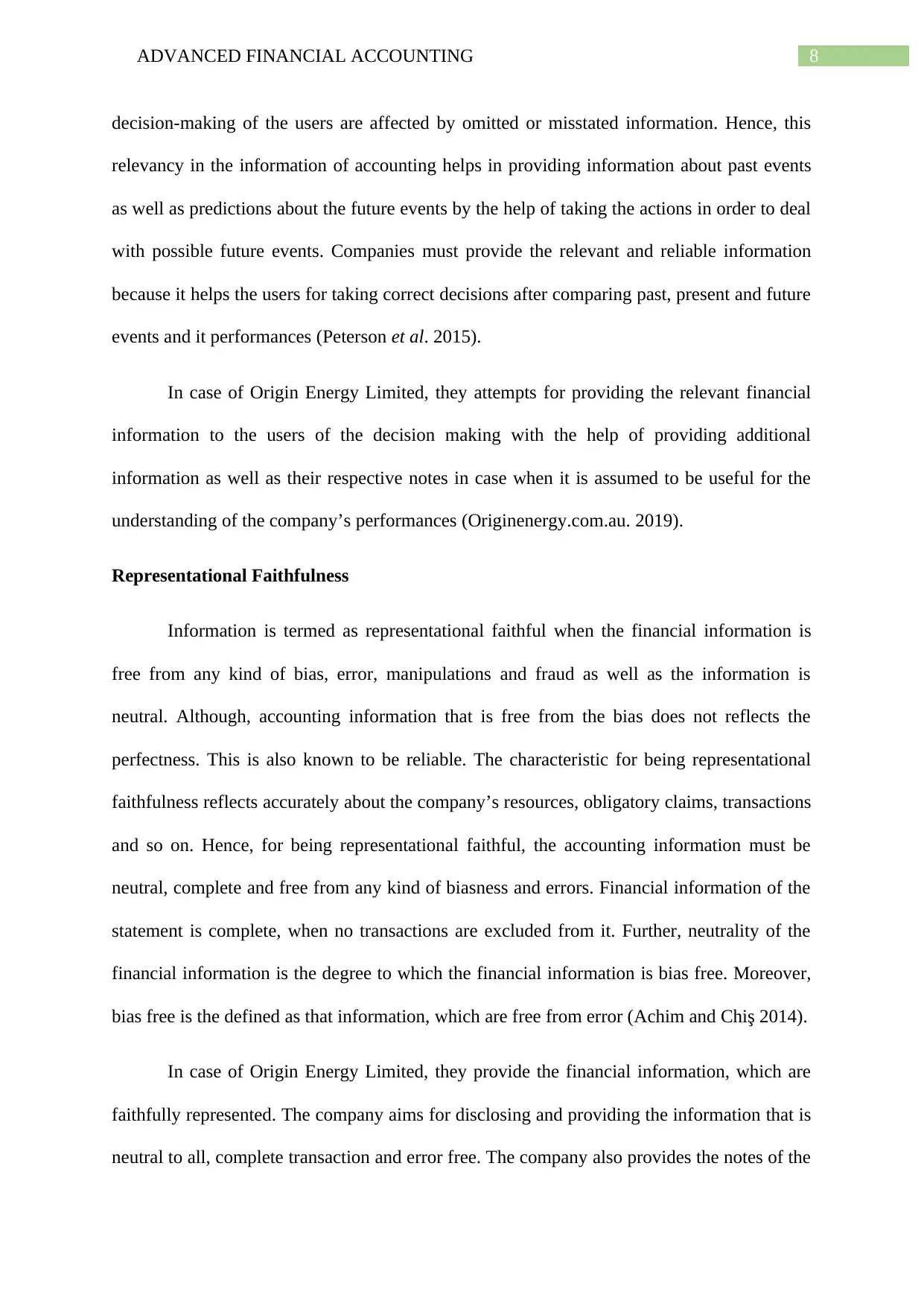
8ADVANCED FINANCIAL ACCOUNTING
decision-making of the users are affected by omitted or misstated information. Hence, this
relevancy in the information of accounting helps in providing information about past events
as well as predictions about the future events by the help of taking the actions in order to deal
with possible future events. Companies must provide the relevant and reliable information
because it helps the users for taking correct decisions after comparing past, present and future
events and it performances (Peterson et al. 2015).
In case of Origin Energy Limited, they attempts for providing the relevant financial
information to the users of the decision making with the help of providing additional
information as well as their respective notes in case when it is assumed to be useful for the
understanding of the company’s performances (Originenergy.com.au. 2019).
Representational Faithfulness
Information is termed as representational faithful when the financial information is
free from any kind of bias, error, manipulations and fraud as well as the information is
neutral. Although, accounting information that is free from the bias does not reflects the
perfectness. This is also known to be reliable. The characteristic for being representational
faithfulness reflects accurately about the company’s resources, obligatory claims, transactions
and so on. Hence, for being representational faithful, the accounting information must be
neutral, complete and free from any kind of biasness and errors. Financial information of the
statement is complete, when no transactions are excluded from it. Further, neutrality of the
financial information is the degree to which the financial information is bias free. Moreover,
bias free is the defined as that information, which are free from error (Achim and Chiş 2014).
In case of Origin Energy Limited, they provide the financial information, which are
faithfully represented. The company aims for disclosing and providing the information that is
neutral to all, complete transaction and error free. The company also provides the notes of the
decision-making of the users are affected by omitted or misstated information. Hence, this
relevancy in the information of accounting helps in providing information about past events
as well as predictions about the future events by the help of taking the actions in order to deal
with possible future events. Companies must provide the relevant and reliable information
because it helps the users for taking correct decisions after comparing past, present and future
events and it performances (Peterson et al. 2015).
In case of Origin Energy Limited, they attempts for providing the relevant financial
information to the users of the decision making with the help of providing additional
information as well as their respective notes in case when it is assumed to be useful for the
understanding of the company’s performances (Originenergy.com.au. 2019).
Representational Faithfulness
Information is termed as representational faithful when the financial information is
free from any kind of bias, error, manipulations and fraud as well as the information is
neutral. Although, accounting information that is free from the bias does not reflects the
perfectness. This is also known to be reliable. The characteristic for being representational
faithfulness reflects accurately about the company’s resources, obligatory claims, transactions
and so on. Hence, for being representational faithful, the accounting information must be
neutral, complete and free from any kind of biasness and errors. Financial information of the
statement is complete, when no transactions are excluded from it. Further, neutrality of the
financial information is the degree to which the financial information is bias free. Moreover,
bias free is the defined as that information, which are free from error (Achim and Chiş 2014).
In case of Origin Energy Limited, they provide the financial information, which are
faithfully represented. The company aims for disclosing and providing the information that is
neutral to all, complete transaction and error free. The company also provides the notes of the
⊘ This is a preview!⊘
Do you want full access?
Subscribe today to unlock all pages.

Trusted by 1+ million students worldwide
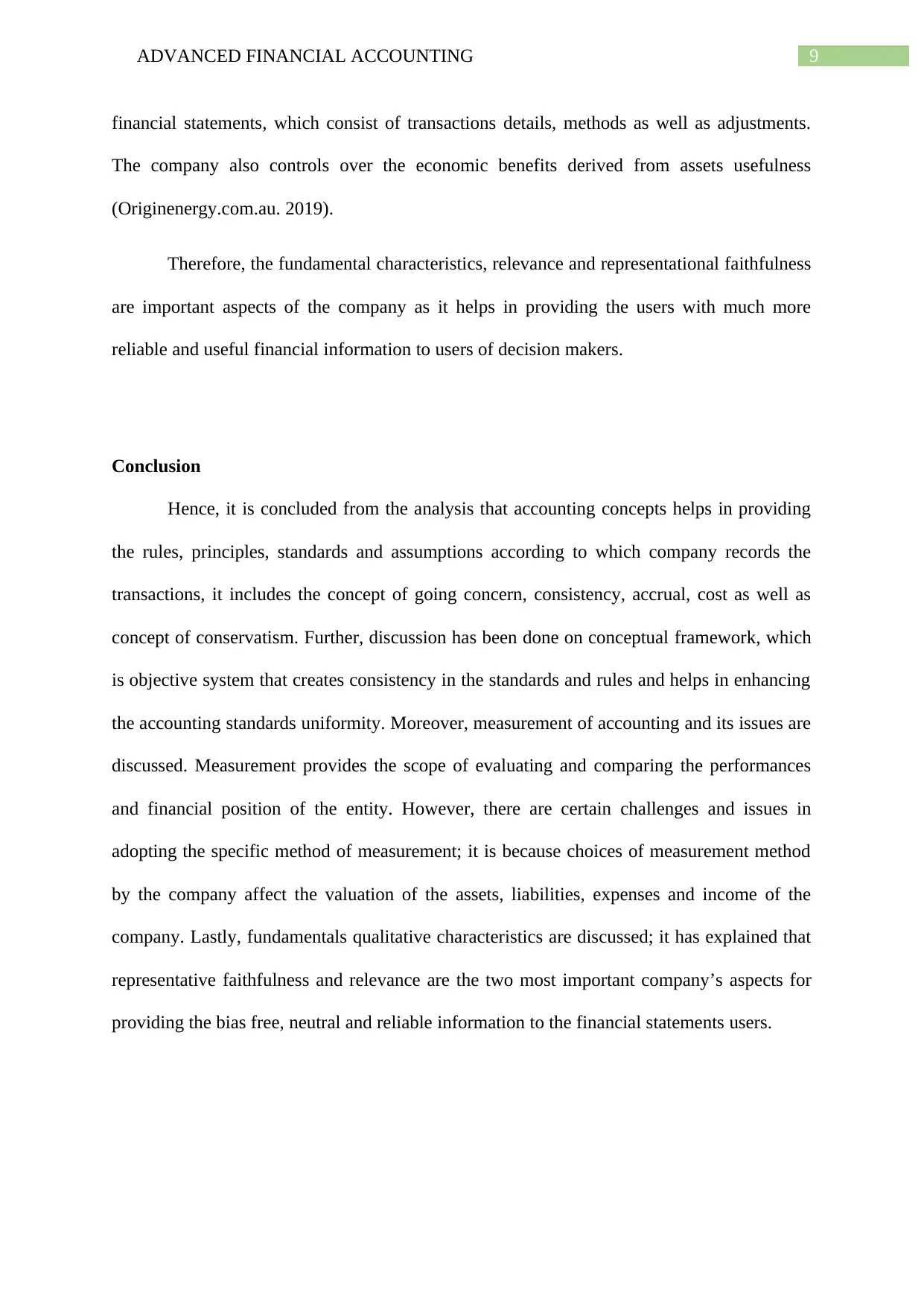
9ADVANCED FINANCIAL ACCOUNTING
financial statements, which consist of transactions details, methods as well as adjustments.
The company also controls over the economic benefits derived from assets usefulness
(Originenergy.com.au. 2019).
Therefore, the fundamental characteristics, relevance and representational faithfulness
are important aspects of the company as it helps in providing the users with much more
reliable and useful financial information to users of decision makers.
Conclusion
Hence, it is concluded from the analysis that accounting concepts helps in providing
the rules, principles, standards and assumptions according to which company records the
transactions, it includes the concept of going concern, consistency, accrual, cost as well as
concept of conservatism. Further, discussion has been done on conceptual framework, which
is objective system that creates consistency in the standards and rules and helps in enhancing
the accounting standards uniformity. Moreover, measurement of accounting and its issues are
discussed. Measurement provides the scope of evaluating and comparing the performances
and financial position of the entity. However, there are certain challenges and issues in
adopting the specific method of measurement; it is because choices of measurement method
by the company affect the valuation of the assets, liabilities, expenses and income of the
company. Lastly, fundamentals qualitative characteristics are discussed; it has explained that
representative faithfulness and relevance are the two most important company’s aspects for
providing the bias free, neutral and reliable information to the financial statements users.
financial statements, which consist of transactions details, methods as well as adjustments.
The company also controls over the economic benefits derived from assets usefulness
(Originenergy.com.au. 2019).
Therefore, the fundamental characteristics, relevance and representational faithfulness
are important aspects of the company as it helps in providing the users with much more
reliable and useful financial information to users of decision makers.
Conclusion
Hence, it is concluded from the analysis that accounting concepts helps in providing
the rules, principles, standards and assumptions according to which company records the
transactions, it includes the concept of going concern, consistency, accrual, cost as well as
concept of conservatism. Further, discussion has been done on conceptual framework, which
is objective system that creates consistency in the standards and rules and helps in enhancing
the accounting standards uniformity. Moreover, measurement of accounting and its issues are
discussed. Measurement provides the scope of evaluating and comparing the performances
and financial position of the entity. However, there are certain challenges and issues in
adopting the specific method of measurement; it is because choices of measurement method
by the company affect the valuation of the assets, liabilities, expenses and income of the
company. Lastly, fundamentals qualitative characteristics are discussed; it has explained that
representative faithfulness and relevance are the two most important company’s aspects for
providing the bias free, neutral and reliable information to the financial statements users.
Paraphrase This Document
Need a fresh take? Get an instant paraphrase of this document with our AI Paraphraser
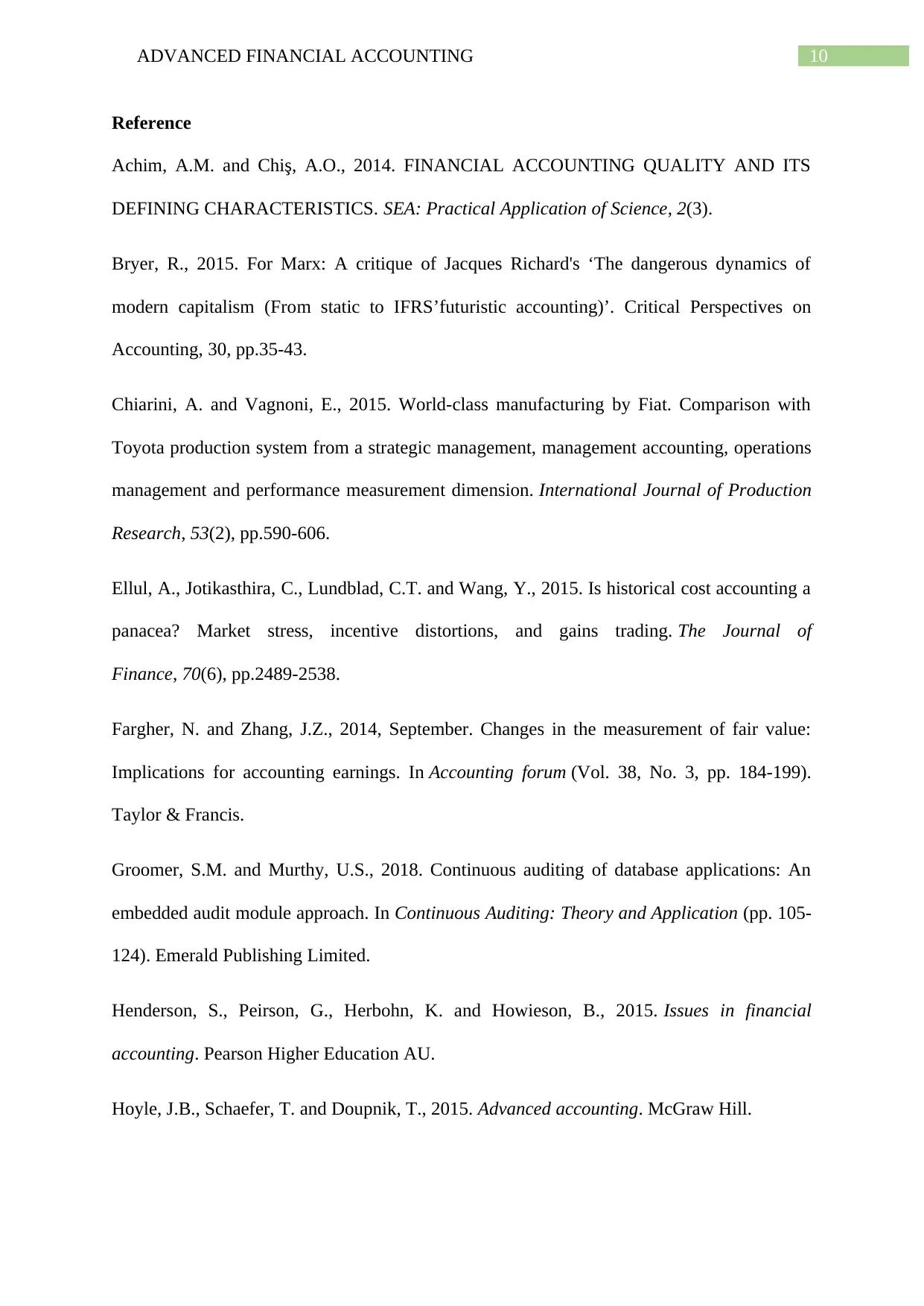
10ADVANCED FINANCIAL ACCOUNTING
Reference
Achim, A.M. and Chiş, A.O., 2014. FINANCIAL ACCOUNTING QUALITY AND ITS
DEFINING CHARACTERISTICS. SEA: Practical Application of Science, 2(3).
Bryer, R., 2015. For Marx: A critique of Jacques Richard's ‘The dangerous dynamics of
modern capitalism (From static to IFRS’futuristic accounting)’. Critical Perspectives on
Accounting, 30, pp.35-43.
Chiarini, A. and Vagnoni, E., 2015. World-class manufacturing by Fiat. Comparison with
Toyota production system from a strategic management, management accounting, operations
management and performance measurement dimension. International Journal of Production
Research, 53(2), pp.590-606.
Ellul, A., Jotikasthira, C., Lundblad, C.T. and Wang, Y., 2015. Is historical cost accounting a
panacea? Market stress, incentive distortions, and gains trading. The Journal of
Finance, 70(6), pp.2489-2538.
Fargher, N. and Zhang, J.Z., 2014, September. Changes in the measurement of fair value:
Implications for accounting earnings. In Accounting forum (Vol. 38, No. 3, pp. 184-199).
Taylor & Francis.
Groomer, S.M. and Murthy, U.S., 2018. Continuous auditing of database applications: An
embedded audit module approach. In Continuous Auditing: Theory and Application (pp. 105-
124). Emerald Publishing Limited.
Henderson, S., Peirson, G., Herbohn, K. and Howieson, B., 2015. Issues in financial
accounting. Pearson Higher Education AU.
Hoyle, J.B., Schaefer, T. and Doupnik, T., 2015. Advanced accounting. McGraw Hill.
Reference
Achim, A.M. and Chiş, A.O., 2014. FINANCIAL ACCOUNTING QUALITY AND ITS
DEFINING CHARACTERISTICS. SEA: Practical Application of Science, 2(3).
Bryer, R., 2015. For Marx: A critique of Jacques Richard's ‘The dangerous dynamics of
modern capitalism (From static to IFRS’futuristic accounting)’. Critical Perspectives on
Accounting, 30, pp.35-43.
Chiarini, A. and Vagnoni, E., 2015. World-class manufacturing by Fiat. Comparison with
Toyota production system from a strategic management, management accounting, operations
management and performance measurement dimension. International Journal of Production
Research, 53(2), pp.590-606.
Ellul, A., Jotikasthira, C., Lundblad, C.T. and Wang, Y., 2015. Is historical cost accounting a
panacea? Market stress, incentive distortions, and gains trading. The Journal of
Finance, 70(6), pp.2489-2538.
Fargher, N. and Zhang, J.Z., 2014, September. Changes in the measurement of fair value:
Implications for accounting earnings. In Accounting forum (Vol. 38, No. 3, pp. 184-199).
Taylor & Francis.
Groomer, S.M. and Murthy, U.S., 2018. Continuous auditing of database applications: An
embedded audit module approach. In Continuous Auditing: Theory and Application (pp. 105-
124). Emerald Publishing Limited.
Henderson, S., Peirson, G., Herbohn, K. and Howieson, B., 2015. Issues in financial
accounting. Pearson Higher Education AU.
Hoyle, J.B., Schaefer, T. and Doupnik, T., 2015. Advanced accounting. McGraw Hill.
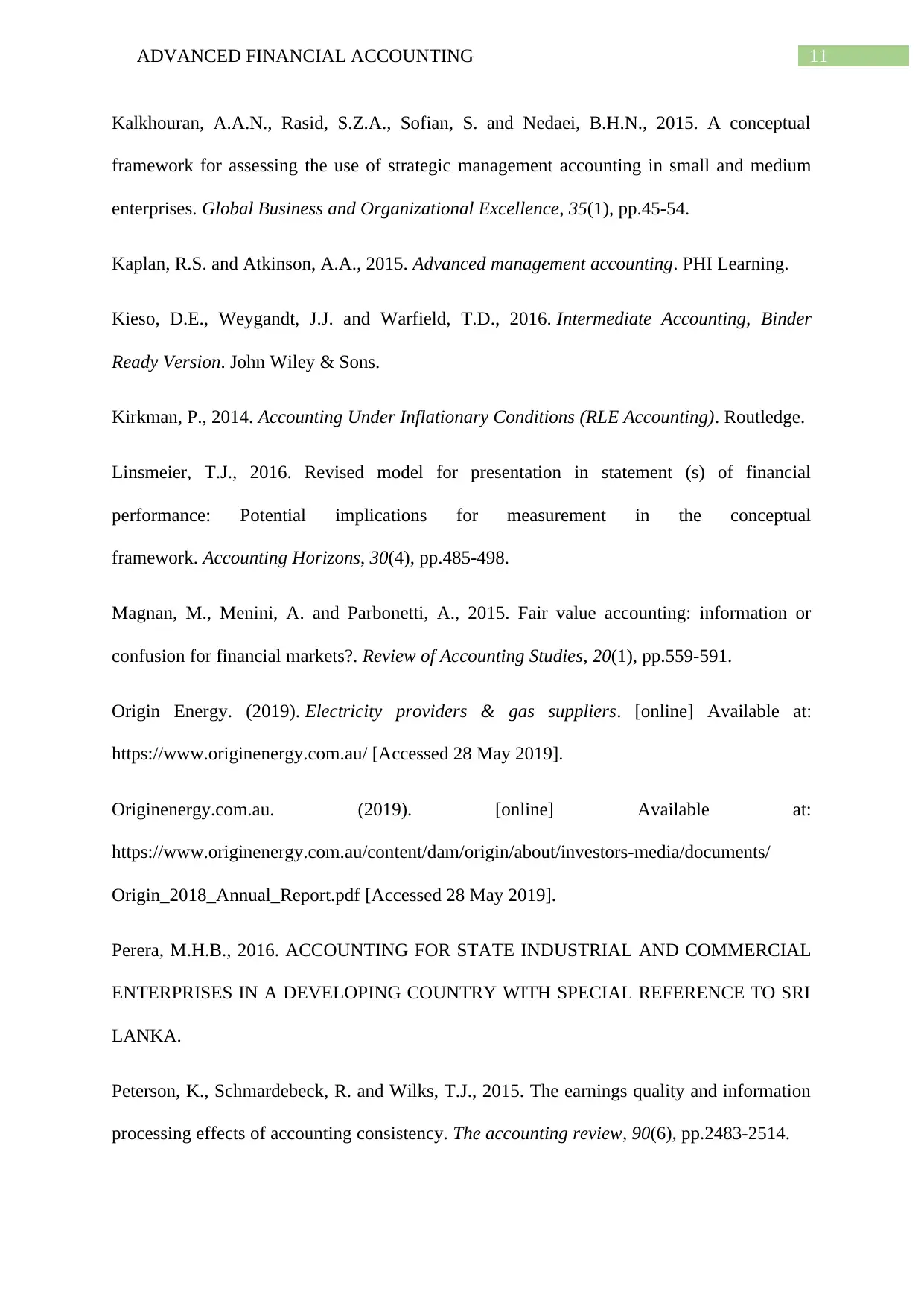
11ADVANCED FINANCIAL ACCOUNTING
Kalkhouran, A.A.N., Rasid, S.Z.A., Sofian, S. and Nedaei, B.H.N., 2015. A conceptual
framework for assessing the use of strategic management accounting in small and medium
enterprises. Global Business and Organizational Excellence, 35(1), pp.45-54.
Kaplan, R.S. and Atkinson, A.A., 2015. Advanced management accounting. PHI Learning.
Kieso, D.E., Weygandt, J.J. and Warfield, T.D., 2016. Intermediate Accounting, Binder
Ready Version. John Wiley & Sons.
Kirkman, P., 2014. Accounting Under Inflationary Conditions (RLE Accounting). Routledge.
Linsmeier, T.J., 2016. Revised model for presentation in statement (s) of financial
performance: Potential implications for measurement in the conceptual
framework. Accounting Horizons, 30(4), pp.485-498.
Magnan, M., Menini, A. and Parbonetti, A., 2015. Fair value accounting: information or
confusion for financial markets?. Review of Accounting Studies, 20(1), pp.559-591.
Origin Energy. (2019). Electricity providers & gas suppliers. [online] Available at:
https://www.originenergy.com.au/ [Accessed 28 May 2019].
Originenergy.com.au. (2019). [online] Available at:
https://www.originenergy.com.au/content/dam/origin/about/investors-media/documents/
Origin_2018_Annual_Report.pdf [Accessed 28 May 2019].
Perera, M.H.B., 2016. ACCOUNTING FOR STATE INDUSTRIAL AND COMMERCIAL
ENTERPRISES IN A DEVELOPING COUNTRY WITH SPECIAL REFERENCE TO SRI
LANKA.
Peterson, K., Schmardebeck, R. and Wilks, T.J., 2015. The earnings quality and information
processing effects of accounting consistency. The accounting review, 90(6), pp.2483-2514.
Kalkhouran, A.A.N., Rasid, S.Z.A., Sofian, S. and Nedaei, B.H.N., 2015. A conceptual
framework for assessing the use of strategic management accounting in small and medium
enterprises. Global Business and Organizational Excellence, 35(1), pp.45-54.
Kaplan, R.S. and Atkinson, A.A., 2015. Advanced management accounting. PHI Learning.
Kieso, D.E., Weygandt, J.J. and Warfield, T.D., 2016. Intermediate Accounting, Binder
Ready Version. John Wiley & Sons.
Kirkman, P., 2014. Accounting Under Inflationary Conditions (RLE Accounting). Routledge.
Linsmeier, T.J., 2016. Revised model for presentation in statement (s) of financial
performance: Potential implications for measurement in the conceptual
framework. Accounting Horizons, 30(4), pp.485-498.
Magnan, M., Menini, A. and Parbonetti, A., 2015. Fair value accounting: information or
confusion for financial markets?. Review of Accounting Studies, 20(1), pp.559-591.
Origin Energy. (2019). Electricity providers & gas suppliers. [online] Available at:
https://www.originenergy.com.au/ [Accessed 28 May 2019].
Originenergy.com.au. (2019). [online] Available at:
https://www.originenergy.com.au/content/dam/origin/about/investors-media/documents/
Origin_2018_Annual_Report.pdf [Accessed 28 May 2019].
Perera, M.H.B., 2016. ACCOUNTING FOR STATE INDUSTRIAL AND COMMERCIAL
ENTERPRISES IN A DEVELOPING COUNTRY WITH SPECIAL REFERENCE TO SRI
LANKA.
Peterson, K., Schmardebeck, R. and Wilks, T.J., 2015. The earnings quality and information
processing effects of accounting consistency. The accounting review, 90(6), pp.2483-2514.
⊘ This is a preview!⊘
Do you want full access?
Subscribe today to unlock all pages.

Trusted by 1+ million students worldwide
1 out of 13
Related Documents
Your All-in-One AI-Powered Toolkit for Academic Success.
+13062052269
info@desklib.com
Available 24*7 on WhatsApp / Email
![[object Object]](/_next/static/media/star-bottom.7253800d.svg)
Unlock your academic potential
Copyright © 2020–2026 A2Z Services. All Rights Reserved. Developed and managed by ZUCOL.





